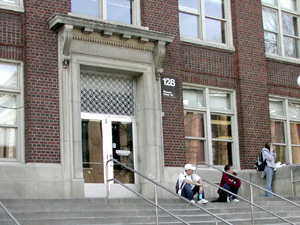| The Future of the University of Minnesota |
Photos
More from MPR
Resources
| ||||||||||||||
March 30, 2005
Minneapolis, Minn. — (AP) Two colleges with a long history at the University of Minnesota would be closed under a proposal released Wednesday to restructure the university's academic programs.
General College and Human Ecology, two colleges that have been an integral part of the university's Twin Cities campus for much of the last century, would be swallowed up by other colleges under recommendations made by a task force formed by the university president.
Much of General College, which has offered underprepared students an opportunity to attend the university for about 75 years, would be absorbed by the College of Education and Human Development, according to the plan. Many programs in Human Ecology, which has existed for more than 100 years, would become part of a new College of Design, university officials said.
Provost Tom Sullivan said the changes aim at promoting academic excellence at the university and making it a world-class university. The university is positioning itself to become one of the top three public research universities in the world.
Another task force has put forward recommendations on the university's administrative operations, which officials say could save the school millions of dollars.
"I think the ideas are far-reaching, I think they're creative," university President Robert Bruininks said.
Bruininks will use the reports to create a set of recommendations for the regents, who will vote on the plan in June.
David V. Taylor, dean of General College, criticized the proposal to shut down the college and said neither he nor other officials at the school were included in the discussion.
"We are now being invited to respond not to the merit of the proposal but to how to best implement it," he said.
The academic task force said in its report that underprepared students accepted by the university should not be put in a separate college but included in degree-granting programs. General College stopped granting degrees in the 1980s.
The report also said the college hasn't achieved enough academic success in that only 10 percent of its students graduate in four years.
Taylor disagrees.
"There's nothing we do that could keep the university from becoming a world-class university," he said. "We are not a drag on the process."
He said the college has less than 6 percent of the university's students and generates enough money from tuition to support itself. He pointed out that 40 percent of General College's students are minorities, compared with 17 percent for the whole university. Closing the college would hurt access to higher education for nontraditional students, he said.
Bruininks said the university remains committed to diversity. "We'll continue to have a wide range of students from a wide range of backgrounds," he said.
Sophomore Kyle Erck said he benefits from the transition General College provides from high school to college and that he likes the one-on-one help he gets from professors.
"I really like e-mailing the professors and they know who I am and where I'm coming from," he said. "In a lot of schools, you are just a number."
Katherine Solheim, Human Ecology associate dean, said the school will work with the university in the restructuring. "What we know is that the work will continue, that it'll just be in a different structure," she said.
Much of the academic task force's work is aimed at more logically coordinating academics by grouping similar disciplines instead of sticking to college divisions that officials say are more historic than sensible.
The report proposes creating a new Honors College to attract talented students from around the country who otherwise would go to more prestigious private schools and promoting more cooperation among the four colleges covering biological sciences, agriculture, food, environmental sciences and natural resources.








